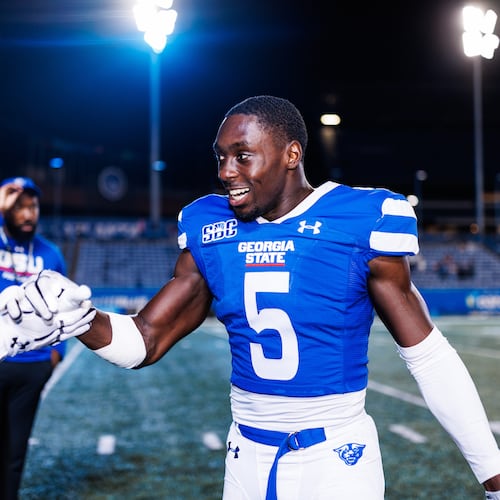After a thumping defeat against No. 1 Clemson on Aug. 29 and a narrow win over South Florida on Saturday, Georgia Tech ventures out for its third game Saturday against The Citadel.
Against the Bulldogs, the Yellow Jackets have plenty to improve upon and address after their performance in the first two games.
What to watch for in Saturday’s game, Tech’s first against The Citadel since 2001.
1. Can the offense be more explosive?
After two games and 133 offensive snaps, the Yellow Jackets have produced six plays that have covered 20 or more yards, tied for 102nd nationally. Playing the defending national champion and then playing without two starting offensive linemen in the next game don’t help the numbers, obviously, not to mention debuting a new offensive scheme.
» RELATED: How to watch all 68 FBS games Saturday
Regardless, offensive coordinator Dave Patenaude said this week that the offense needed to create more explosive plays after the Jackets averaged 3.7 yards per play against the Bulls and managed only one completion out of 14 that gained 20 yards.
Patenaude said that there were at least eight or nine plays that were close to breaking for big plays.
“There was a lot of plays where it was very close,” offensive tackle Zach Quinney. “You’re talking one (more) step, and it’s gone, just from an offensive line perspective. That’s something that’s going to come with time.”
Targets such as tight end Tyler Davis and wide receiver Malachi Carter – a combined six catches for 35 yards – are waiting for their chance.
Over the course of the season, “they’ll get their numbers,” Patenaude said.
2. The littlest defensive end
Cornerback Kenan Johnson stands 6-foot-1 and weighs 185 pounds, but he was used on occasion Saturday as a defensive end. In some third-and-long situations, defensive coordinator Andrew Thacker lined him up wide of the offensive tackle as a speed rusher as part of the defense’s “Prowler” package.
The intent of the grouping is “to get as many fast defensive and disruptive players on the field,” Thacker said. For a defense that has lacked for dominating pass rushers, it’s Thacker’s attempt to use what’s on the roster.
At Temple, Thacker played running back Ryquell Armstead in the Prowler set. In the spring, coaches took a look at wide receiver Jalen Camp as an edge rusher.
“We don’t have Von Miller right now on our team, we don’t have Khalil Mack,” he said, referencing two of the NFL’s dominant pass rushers. “So we’re not going to be confined by body types or by tradition. We’re going to be creative and try to find disruptive players.”
The efforts of Johnson (and Thacker) helped Tech limit South Florida to 4-for-15 on third downs.
3. Distribution of playing time at running back
Through two games, running back Jordan Mason has 33 of the 41 carries that Tech running backs have handled -- and with reason. Mason has run hard, broken tackles and been productive, averaging 5.2 yards per carry and scoring twice. His 99 rushing yards against South Florida were a career high.
It helps, too, that he has come along in pass protection, giving coaches even less reason to take him off the field. That said, the position was viewed as a strength going into the season, and offensive coordinator Dave Patenaude has spoken of wanting a rotation at running back.
Saturday’s game could be a chance for Patenaude to spread the touches around to backs such as Dontae Smith, Christian Malloy, Nathan Cottrell and Jamious Griffin, who have a combined four touches on offense through two games. Patenaude said that finding ways to get them on the field has been discussed.
4. Other lineup matters
Besides the rotation at running back, there are a number of questions about the lineups that coach Geoff Collins will send out onto the field. After quarterback Tobias Oliver and then Lucas Johnson received the majority of the playing time in the first two games, respectively, what arrangement will Tech go with against The Citadel?
Center Kenny Cooper and left guard Mikey Minihan were injured against South Florida, and their status for Saturday’s game is uncertain. Defensive end Chico Bennett is another player who was injured against the Bulls and may not be able to play against the Bulldogs. Tech has an open date next week before going to Temple, which could factor in decision making.
Linebacker Demetrius Knight may be in position to play more behind starter David Curry as he develops.
How Collins uses kickers Brenton King and Wesley Wells will be watched, as well. King handled kickoffs, the two extra points and the lone field-goal try against South Florida, a surprise to many after Wells’ strong performance last season. Collins said that King earned the right through competition in practice leading up to the game.
5. Handling the option
Tech fans know all about the power of the spread-option offense. When run effectively, it can enable teams to compete with more talented opponents. The Citadel, which uses an offense similar to former coach Paul Johnson’s, poses that threat to the Jackets.
The challenges will sound familiar. Keep the Bulldogs out of third-and-short situations. Don’t get caught watching the ball or biting on fakes, which can lead to big plays. Defeat cut blocks and stay on your feet.
It helps that Tech defenders saw the offense executed at a high level in practices in years past, and also that Thacker and Collins have experience defending the spread-option offense. Also, The Citadel, which is 0-2 after losses to two Top 25 FCS teams (Towson and Elon), is not as vaunted a practitioner of the offense as, say, Army.
“It does not matter that Citadel is an FCS team,” Thacker said. “It does not matter (about) any talent disparity. Because that offense can equalize anything if they execute at a high level.”
About the Author
Keep Reading
The Latest
Featured

